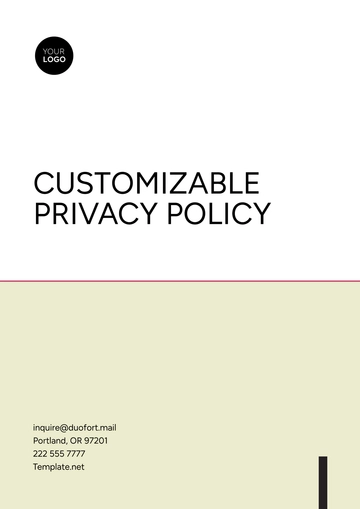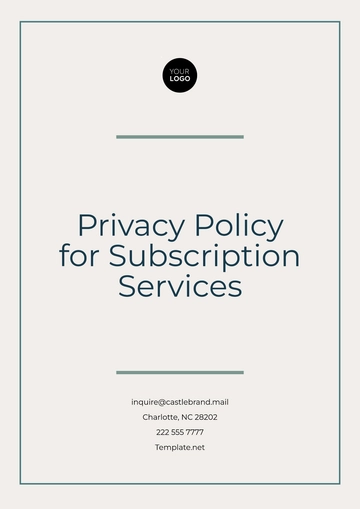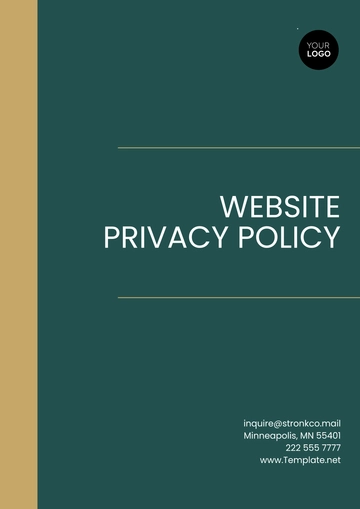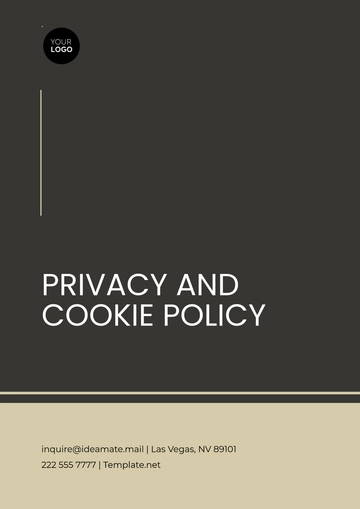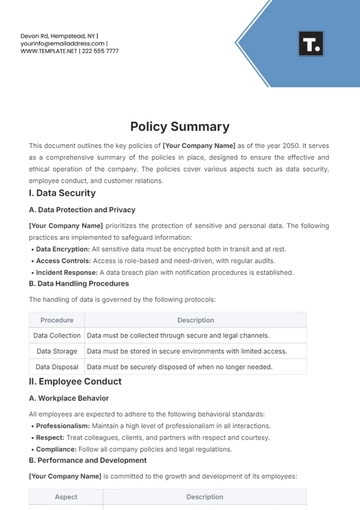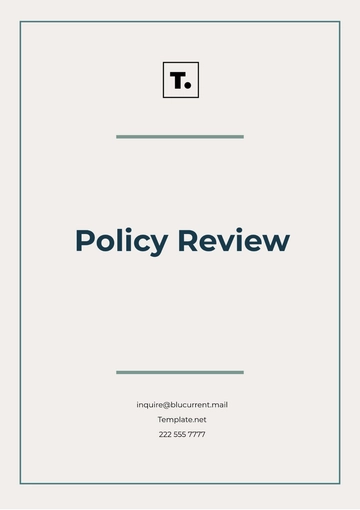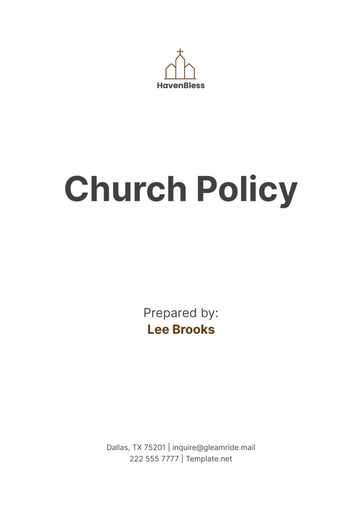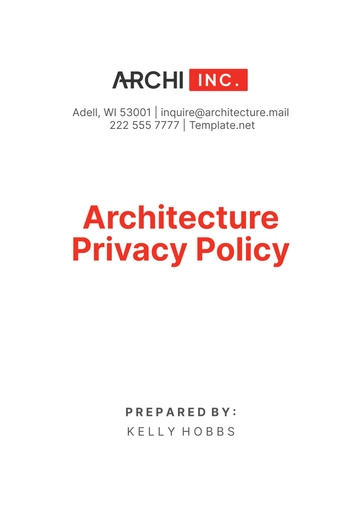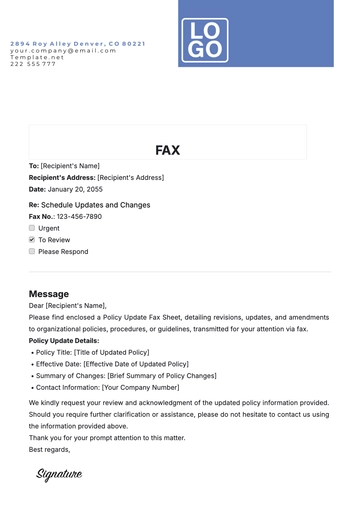Free Church Policy
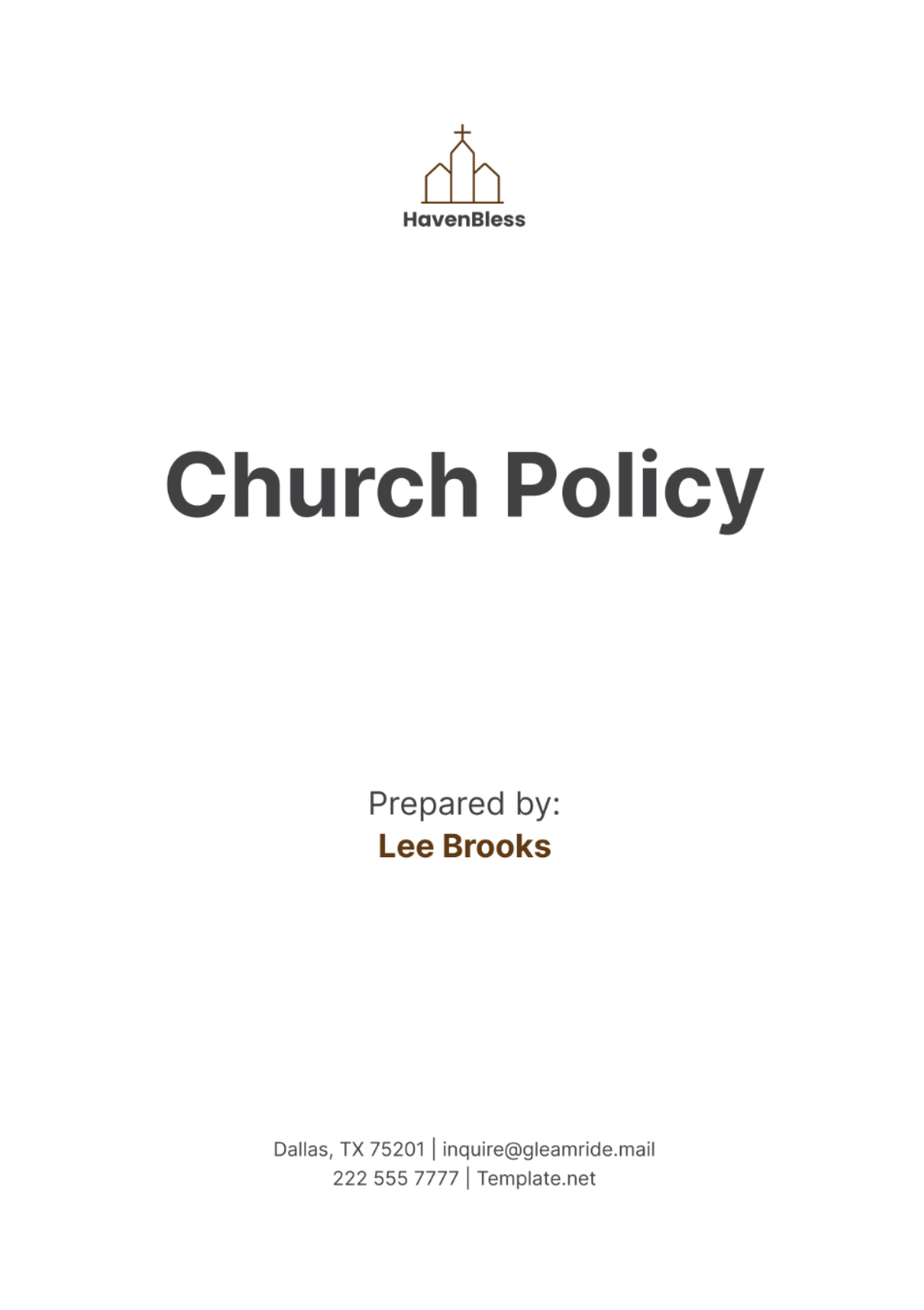
I. Introduction
A. Purpose of the Policy
The purpose of this policy is to provide a structured framework for the effective operation and management of [Your Company Name]. It aims to ensure that all activities align with the church's mission and values while maintaining transparency and accountability. This policy serves as a reference for leaders, staff, and members to guide their actions and decisions.
B. Scope and Applicability
This policy applies to all aspects of church life, including governance, financial management, worship, and facility use. It is relevant to members, staff, volunteers, and any external parties interacting with the church. All individuals associated with [Your Company Name] are expected to familiarize themselves with and adhere to this policy.
C. Definitions and Key Terms
Church Leadership: Refers to the individuals in senior positions responsible for the overall direction and oversight of the church's operations, including the Senior Pastor and Board of Elders.
Member: An individual who has formally committed to the church through a membership process and participates actively in its life and activities.
Facility: Any property or building owned or rented by [Your Company Name] that is used for church services, meetings, or events.
II. Governance and Leadership
A. Church Structure
Overview of Leadership Roles
The Senior Pastor is the primary spiritual leader, responsible for preaching, pastoral care, and overall church vision. The Associate Pastor supports the Senior Pastor and focuses on specific ministries such as youth or outreach programs. The Board of Elders provides governance, strategic oversight, and ensures that the church's activities are in line with its mission and values.
Responsibilities and Duties
The Senior Pastor is tasked with setting the spiritual direction and leading worship services. The Associate Pastor handles the implementation of ministry programs and assists in counseling and outreach. The Board of Elders is responsible for policy development, financial oversight, and resolving major issues affecting the church.
B. Decision-Making Procedures
Regular Meetings
Leadership meetings occur bi-weekly to review ongoing church activities, address concerns, and plan future initiatives. These meetings ensure that all aspects of church operations are monitored and managed effectively. Special meetings may be called to address urgent matters or significant decisions.
Voting and Approval Processes
Major decisions, including budget approvals and policy changes, require a majority vote from the Board of Elders. Decisions are documented in meeting minutes to maintain transparency and provide a record of the proceedings. In cases of tie votes, the Senior Pastor has the deciding vote.
C. Conflict of Interest
Disclosure Requirements
All leaders and staff must disclose any potential conflicts of interest, such as financial interests or personal relationships that could affect their duties. Disclosures must be made in writing to the Board of Elders at the start of their service or as soon as a conflict arises. Failure to disclose conflicts may result in disciplinary action.
Procedures for Addressing Conflicts
The Board of Elders will review any disclosed conflicts to determine if they impact the individual’s ability to perform their role impartially. If necessary, the Board will implement measures to manage or mitigate the conflict, such as reassigning responsibilities. All actions taken will be documented to ensure accountability.
III. Membership
A. Membership Requirements
Process for Joining
Prospective members must complete a membership application and attend a membership orientation class, which covers church beliefs, practices, and expectations. An interview with a church leader may also be required to assess the candidate’s alignment with the church’s mission. Membership is granted following a review and approval by the Board of Elders.
Expectations and Commitments
Members are expected to regularly attend services, participate in church activities, and contribute to the church’s mission through service and financial support. They should uphold the church’s values in their personal conduct and contribute to fostering a positive community environment. Active participation in church life is encouraged to deepen their spiritual growth and community connection.
B. Membership Rights and Responsibilities
Participation in Church Life
Members have the right to vote on major church decisions, such as budget approvals and changes to church policies. They are also eligible to serve in various church ministries and leadership roles, based on their gifts and calling. Participation in congregational meetings and activities is encouraged to stay informed and involved.
Financial Contributions
Members are encouraged to support the church financially through regular tithes and offerings, which are vital for sustaining church operations and ministries. Financial contributions are used to fund the church’s programs, missions, and facility maintenance. The church provides regular updates on how contributions are utilized to maintain transparency.
C. Addressing Membership Issues
Disciplinary Procedures
When a member’s behavior or actions are inconsistent with church standards, the Board of Elders will initiate a process of counseling and correction. This process involves meeting with the member to discuss concerns, provide guidance, and outline expectations for improvement. If necessary, disciplinary actions may include suspension or removal from membership.
Appeals Process
Members who disagree with disciplinary actions may appeal the decision by submitting a written appeal to the Board of Elders. The appeal will be reviewed, and the Board may convene a special meeting to discuss the matter further. The final decision on the appeal will be communicated in writing to the member, with a summary of the resolution process.
IV. Financial Management
A. Budgeting and Financial Planning
Annual Budget Preparation
The Finance Committee develops the annual budget based on projected income from donations, grants, and other sources. This budget outlines anticipated expenses, including staff salaries, program costs, and facility maintenance. The draft budget is reviewed by the Board of Elders before being presented to the congregation for approval.
Budget Approval Process
The proposed budget is presented to the congregation at the Annual General Meeting, where members have the opportunity to review and discuss it. Approval requires a majority vote from the congregation to ensure broad support and transparency. Once approved, the budget is implemented, and expenditures are monitored against the approved plan.
B. Financial Reporting and Accountability
Regular Financial Reports
The Finance Committee prepares monthly financial reports that include detailed statements on income, expenses, and overall financial health. These reports are reviewed by the Board of Elders to ensure that financial management aligns with the approved budget and policy guidelines. Copies of the reports are made available to the congregation upon request.
Audit Procedures
An independent auditor is engaged annually to conduct a thorough review of the church’s financial records and practices. The audit ensures compliance with accounting standards and identifies any discrepancies or areas for improvement. The audit report is presented to the Board of Elders and the congregation, along with a summary of any recommendations.
C. Donations and Fundraising
Acceptable Practices
Donations and fundraising activities must align with the church’s mission and ethical standards, ensuring that all practices are transparent and above board. Donors are informed about how their contributions will be used to support specific programs or needs. The church maintains records of all donations to provide accurate reports and acknowledgments.
Fundraising Guidelines
All fundraising events must be approved by the Board of Elders, which reviews proposals to ensure they are consistent with the church’s values and goals. Guidelines include ethical fundraising practices, proper handling of funds, and clear communication with donors. Post-event evaluations are conducted to assess the effectiveness and impact of the fundraising efforts.
V. Worship and Programs
A. Worship Services
Service Scheduling and Planning
Worship services are scheduled weekly on Sundays and for major religious observances, with special services planned for significant church events. The Worship Planning Team coordinates themes, sermon topics, and music selections to create engaging and spiritually enriching experiences. Adjustments to the schedule are communicated to the congregation in advance.
Roles and Responsibilities
The Worship Team, including musicians, singers, and volunteers, is responsible for preparing and delivering each service. Roles are assigned based on individual skills and availability, with training provided to ensure high-quality worship experiences. Volunteers are encouraged to participate in various aspects of the service, including greeting and ushering.
B. Educational Programs
Curriculum Development
Educational programs, including Sunday school and Bible study groups, are designed to support spiritual growth and biblical literacy. Curriculum development involves selecting relevant materials and topics that align with the church’s teachings and address the needs of different age groups. Regular evaluations are conducted to assess the effectiveness of the programs.
Program Scheduling
Educational programs are scheduled throughout the week, including weekends and weekday evenings, to accommodate different schedules and maximize participation. Changes to the program schedule are communicated through church bulletins, announcements, and the church website. Feedback from participants is used to adjust and improve program offerings.
C. Special Events
Event Planning and Coordination
Special events, such as conferences, retreats, and community outreach activities, are planned by the Event Coordination Team. This team handles logistics, including scheduling, promotions, and coordination with external vendors or partners. Approval for major events is obtained from the Board of Elders to ensure alignment with church goals.
Use of Church Facilities
Church facilities are available for use by members and external groups for approved events, subject to scheduling and adherence to church policies. Facility use guidelines include rules for setup, cleanup, and maintenance to ensure the facilities are well-kept. Any damage or issues must be reported and addressed promptly.
VI. Facility Management
A. Use of Church Facilities
Reservation Procedures
All requests to use church facilities must be submitted through a formal reservation process, including completing a Facility Use Request Form. The form must be submitted to the Church Administrator at least 30 days prior to the event date. Reservations are approved based on availability and alignment with church activities and priorities.
Facility Usage Guidelines
Users must adhere to guidelines regarding facility use, including setup and cleanup procedures, to ensure that facilities remain in good condition. Specific rules address issues such as noise levels, food and beverage policies, and maximum occupancy limits. Any special requests or accommodations must be approved in advance by the Church Administrator.
B. Maintenance and Repairs
Routine Maintenance
Routine maintenance is conducted regularly to ensure the safety and functionality of church facilities. This includes tasks such as cleaning, landscaping, and inspecting equipment. A Maintenance Schedule is maintained and reviewed periodically to address any emerging needs or issues.
Repair Requests
Any maintenance or repair issues should be reported immediately to the Church Administrator, who will prioritize and schedule necessary repairs. Urgent repairs are addressed as quickly as possible to minimize disruptions. A record of repairs and maintenance is kept for accountability and future reference.
C. Safety and Security
Emergency Procedures
Emergency procedures are established for various situations, including fire, medical emergencies, and natural disasters. These procedures are communicated to all staff, volunteers, and regular attendees through training sessions and posted notices. Regular drills are conducted to ensure preparedness.
Security Measures
Security measures include locking protocols, surveillance systems, and access control to protect the church’s property and members. Security personnel or volunteers are assigned to monitor events and facilities as needed. Any security concerns or incidents are reported to the Church Administrator and addressed promptly.
VII. Communication and Outreach
A. Internal Communication
Channels of Communication
Internal communication includes regular meetings, newsletters, and electronic updates to keep members informed about church activities and announcements. The church uses various platforms, including email, social media, and bulletin boards, to reach members effectively. Communication strategies are reviewed periodically to ensure effectiveness.
Feedback Mechanisms
Members are encouraged to provide feedback through suggestion boxes, surveys, and direct communication with church leaders. Feedback is reviewed regularly to address concerns and improve church operations. The church values open communication and strives to respond to feedback in a timely manner.
B. External Communication
Public Relations
External communication involves managing the church’s public image and relationships with the community. This includes handling media inquiries, press releases, and community outreach initiatives. A Public Relations Team is responsible for coordinating these efforts and ensuring consistent messaging.
Marketing and Outreach
Marketing efforts include promotional materials, social media campaigns, and community events to engage new members and raise awareness about the church. Outreach programs are designed to meet community needs and build positive relationships with local organizations. The effectiveness of marketing and outreach efforts is evaluated regularly.
C. Digital Presence
Website Management
The church website serves as a central hub for information about services, events, and resources. Regular updates are made to ensure that content is current and relevant. The Website Administrator is responsible for managing the site and addressing any technical issues.
Social Media
Social media platforms are used to share updates, events, and inspirational content with the broader community. Guidelines for social media use ensure that posts reflect the church’s values and mission. Engagement with followers is monitored to foster positive interactions and respond to inquiries.
VIII. Legal and Compliance
A. Legal Responsibilities
Adherence to Laws
The church complies with all applicable local, state, and federal laws, including those related to employment, safety, and financial reporting. Legal compliance is monitored through regular reviews and updates to policies and procedures. Any legal issues are addressed in consultation with legal counsel.
Liability Insurance
The church maintains liability insurance to protect against potential claims and damages related to church activities. Insurance coverage is reviewed annually to ensure adequacy and relevance. Claims are managed in coordination with the insurance provider and church leadership.
B. Privacy and Confidentiality
Handling Personal Information
Personal information collected from members and staff is handled with strict confidentiality and used only for church-related purposes. Policies are in place to protect sensitive data and ensure secure storage and access. Any breaches of confidentiality are addressed immediately.
Confidential Reporting
Procedures are in place for confidential reporting of concerns or misconduct. Reports can be made anonymously if preferred, and will be handled discreetly by designated personnel. The church is committed to addressing reports with fairness and confidentiality.
C. Compliance with Church Doctrine
Alignment with Beliefs
All policies and practices must align with the church’s core beliefs and doctrinal standards. Regular reviews ensure that church activities and programs reflect the church’s teachings and mission. Any deviations or concerns are addressed through a review process involving church leadership.
Training and Education
Training programs are provided to ensure that staff, leaders, and volunteers understand and adhere to church doctrine and policies. Educational materials are updated regularly to reflect any changes in policy or doctrine. Training sessions are conducted periodically to reinforce understanding and compliance.
IX. Volunteer and Staff Management
A. Recruitment and Training
Volunteer Recruitment
Volunteers are recruited through announcements, personal invitations, and community outreach. The recruitment process includes interviewing and assessing candidates to ensure their suitability for specific roles. Volunteers are provided with an overview of their responsibilities and expectations.
Staff Training
Staff members undergo comprehensive training upon hiring and participate in ongoing professional development. Training includes orientation on church policies, job-specific skills, and leadership principles. Training effectiveness is evaluated through feedback and performance assessments.
B. Performance Evaluation
Regular Reviews
Performance evaluations are conducted annually for staff and key volunteers to assess their effectiveness and provide feedback. Evaluations include setting goals, reviewing achievements, and identifying areas for improvement. Performance reviews are used to guide professional development and address any issues.
Feedback and Development
Feedback is provided regularly through informal and formal channels to support continuous improvement. Development opportunities, such as workshops and mentoring, are offered to help individuals grow in their roles. Constructive feedback aims to enhance performance and contribute to personal and professional growth.
C. Recognition and Rewards
Acknowledging Contributions
Contributions of staff and volunteers are recognized through formal and informal means, including appreciation events and awards. Recognition helps to motivate and encourage continued service and commitment. The church values and celebrates the efforts and achievements of its team members.
Incentives and Benefits
Incentives, such as additional training opportunities or small tokens of appreciation, may be offered to recognize outstanding performance. Benefits may include access to special events or resources as a way to reward dedication and hard work. Incentive programs are reviewed periodically to ensure they are effective and aligned with church values.
X. Policy Review and Updates
A. Review Schedule
Periodic Reviews
The policy is reviewed every three years to ensure that it remains relevant and effective. Reviews involve assessing current practices, gathering feedback, and making necessary updates. Any significant changes in church operations or external regulations will trigger an earlier review.
Stakeholder Involvement
Stakeholders, including church leaders, staff, and members, are involved in the review process to provide diverse perspectives and insights. Feedback is collected through surveys, meetings, and written submissions. The review process aims to incorporate input from all relevant parties.
B. Revision Procedures
Proposal of Changes
Proposed changes to the policy must be submitted in writing to the Board of Elders, outlining the rationale and expected impact. The proposal is reviewed and discussed in meetings before any changes are made. Feedback from the congregation is considered during the proposal review.
Approval Process
Revised policies are presented to the congregation at the Annual General Meeting or a specially convened meeting for approval. A majority vote is required to implement changes, ensuring that revisions have broad support. Approved changes are communicated to all stakeholders and incorporated into the policy document.
- 100% Customizable, free editor
- Access 1 Million+ Templates, photo’s & graphics
- Download or share as a template
- Click and replace photos, graphics, text, backgrounds
- Resize, crop, AI write & more
- Access advanced editor
Introducing the Church Policy Template from Template.net—your ultimate solution for streamlined policy management. This editable and customizable template ensures your church policies are clear and professional. With the AI Editor Tool, easily tailor the document to your specific needs and values. Save time and ensure consistency with this versatile tool designed for your church’s unique requirements.
You may also like
- HR Policy
- Restaurant Policy
- Company Policy
- Accounting Policies and Procedures
- Website Policy
- Privacy Policy
- Safety Policy
- School Policy
- IT and Software Policy
- Law Firm Policy
- Construction Policy
- Interior Design Policy
- Travel Agency Policy
- Education Academic Policy
- Security Policy
- Real Estate Policy
- Expense Policy
- Software Policy

